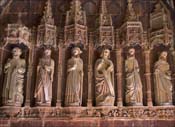Feature Essay

Good revolutionaries get slaughtered. That might be one way of characterizing the lesson of Barabbas. On that scary day 2,000 years ago, when Hell unleashed its fury on the God Man, that wicked man was freed to go. We don't know what happened to him, but on that day, the bad revolutionary thrived.
As have many other bad revolutionaries, like Lenin and Stalin, Hitler and Mao. Heck, even Jane Fonda and William Ayers have thrived, even though most people today don't like them.
But for good revolutionaries, the result is often the opposite (a goodly chunk of our country's founders notwithstanding).
Socrates, for instance. The Athenians convicted him of corrupting the people and denying its gods. They forced him to drink hemlock. A less-fatal thing happened to the prophet Jeremiah in the late seventh century b.c., who was beaten, jailed, and nearly killed for telling the people of their sins and showing no patience for the worthless religious establishment of his day. Christ is also a good example.
As are his disciples following his death.
These ragged men were a pack of revolutionaries, albeit of the good sort.
The Book of Acts tells us they disrupted all sorts of conventions and norms, upset the regular workings of society.
And they suffered cruelly for their politically-incorrect ways. Peter, for instance, was arrested and held him for nine months in the Tullian Keep, a nasty dungeon. But he kept agitating: the authorities had to change the guard constantly because he kept converting his keepers. They eventually crucified him, upside down. He requested the upside down part, but we don't know the reason. It may have been practical: he'd lose consciousness and thereby reduce the suffering. It may have been an act of piety: he didn't deem himself worthy to die just like his master.
With the exception of John and possibly Matthew, things didn't end much better for the other apostles. Their list of deaths could be a reference guide to killing people in the ancient world:
Andrew: Crucifixion
Simon: Mutilation (sawing)
Jude: Impalement
Thomas: Stabbing
James the Lesser: Stoning
James the Greater: Decapitation
Philip: Crucifixion
Bartholomew: Flaying
Matthias: Stoning
Their earliest followers didn't get much better treatment. James the Righteous (author of the epistle) was thrown from a roof, then stoned, and then killed with a sledgehammer blow to the head. The first deacon, Stephen, was stoned to death. For the next three centuries, persecutions against the unusual Christian erupted frequently.
In the midst of slaughter, the Church preached the goodness of martyrdom for the sake of Christ. The blood of the martyrs watered the ground prepared by Christ.
